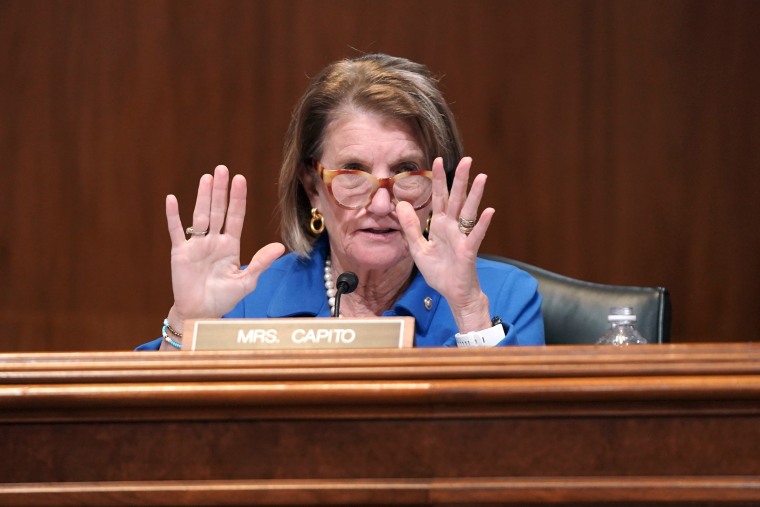WASHINGTON — First, Republican Sen. Shelley Moore Capito said Wednesday that a price tag of $600 billion to $800 billion was the "sweet spot" for bipartisan agreement on infrastructure.
But Thursday, after some fellow Republicans expressed misgivings about a number that high, Capito, of West Virginia, backpedaled when she was asked about her comfort level.
"It's too early to say right now," Capito told reporters Thursday. "We don't have a detailed figure attached to that, and it probably won't be, I wouldn't think, an amount certain. More of a range of where we think we could fall and begin to negotiate."
More than a week after President Joe Biden announced a sprawling $2.25 trillion package that includes proposals addressing bridges to nurses, Republicans are struggling to begin putting together their own package — underscoring the titanic effort that will be needed to reach a bipartisan agreement.
The parties don't even agree about what they're negotiating. The White House has conceded that Biden's proposal stretches the definition of infrastructure to include roads to child care, and it is calling it the "American Jobs Plan." But Republicans criticize the package as being too large and insist that it should be limited to projects that both parties consider infrastructure, like roads and bridges.
Republicans agree on one thing: They don't like Biden's proposal. But that's about all.
Capito, who, as the top Republican on the Environment and Public Works Committee, is stuck in the middle of the struggle, said she's crafting a "conceptual Republican bill" that includes investments in roads and bridges.
"We're working on that right now. We haven't made consensus on it," she said.
A counteroffer is key to beginning any process that might resemble negotiations.
While Congress was hammering out a massive Covid-19 relief bill this year, 10 Republicans offered a $618 billion counteroffer to Biden's $1.9 trillion plan, presenting it as an option to reach bipartisan agreement.
But now, the lack of a GOP alternative could make it easier for Democrats to again throw up their hands and move ahead with a partisan bill that uses a budget maneuver to avoid the filibuster. Some Democrats aides already doubt that Republicans will accept any deal.
Biden and other Democrats insist that they want to negotiate a bipartisan plan and are eager to see what Republicans are willing to support. Sen. Mitt Romney, R-Utah, who is seen as a winnable vote, told reporters that Capito's $600 billion-to-$800 billion range "seems a little high."
Some Republican aides doubt that Democrats are serious about compromising and suspect that they will steamroll Republicans again, as they did with the Covid-19 relief package.
The White House, which has met with lawmakers from both parties to discuss his proposals, says Biden wants to negotiate.
"He has put his ideas out, and he's put a way to pay for it out. And he is anxious to look at other people's ideas," a White House adviser said. "The one thing that he will not agree to is inaction. These are investments the country has needed for years."
Republican senators are unified in opposing the $2.25 trillion price tag, a corporate tax hike (which Capito called a "nonnegotiable red line") and spending provisions that they say don't count as infrastructure, such as elder care.
"I think we're united that the president's package is not an infrastructure package. It's a huge tax increase," said Sen. Roger Wicker of Mississippi, the top Republican on the Commerce Committee.
Wicker added that Biden's package is "way too big."
"To accommodate our Democratic friends and White House, we're perfectly — we're willing to talk about a much larger infrastructure package than we're used to," he said, adding that he was "optimistic" after his one-hour, 40-minute meeting with Biden.
And Republicans doubt that Senate Minority Leader Mitch McConnell, R-Ky., would support any deal.
"If Democrats want to negotiate in good faith on a truly infrastructure package, I don't know if it would get Senator McConnell's vote, but I think there are a number of Republican votes in support of a package to include the highway bill, water, sewer, broadband, things like that," Senate Minority Whip John Thune, R-S.D., said Wednesday. "Much smaller than what the Democrats have proposed, but more focused."
An NPR/PBS/Marist poll taken this month found that 56 percent of U.S. adults support Biden's plan; 34 percent said they oppose it.
Democrats may ultimately move ahead without Republican support. But because of razor-thin margins in both chambers, they will need just about all their members to be on board to pass a bill.
Lawmakers like Sen. Joe Manchin, D-W.Va., who has cultivated an independent brand in a deeply Republican state, are demanding bipartisan outreach.
But Manchin, who has called for an "enormous" infrastructure bill paid for by increasing taxes on the rich, has also insisted that Republicans negotiate and find compromise. He said last month that blanket opposition to tax increases is not a "reasonable" position.
Manchin declined Thursday to endorse the $800 billion figure Capito had suggested.
"We're going to do whatever it takes. If it takes $4 trillion, I'd do $4 trillion, but we have to pay for it," he told reporters.
House Transportation Committee Chair Peter DeFazio, D-Ore., took an optimistic view when he was asked Thursday about Capito's remarks.
"I'm glad they're showing a willingness to at least recognize the need for significant investment in infrastructure," he told reporters. "So that's a good starting point."


